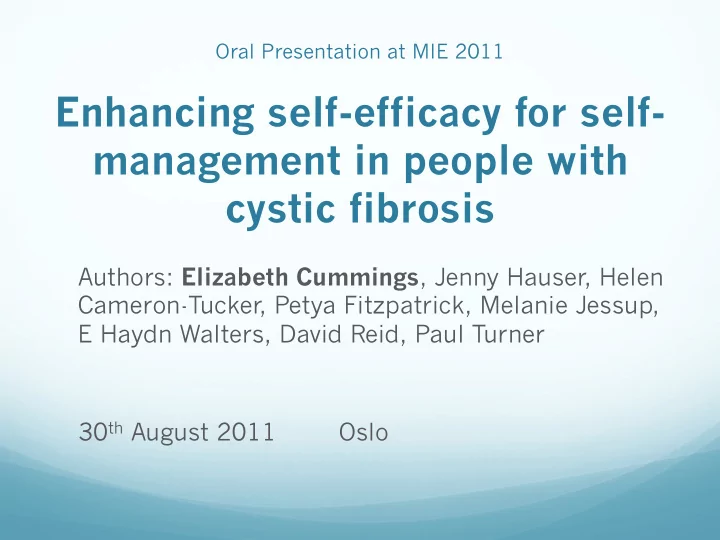

Oral Presentation at MIE 2011 Enhancing self-efficacy for self- management in people with cystic fibrosis Authors: Elizabeth Cummings , Jenny Hauser, Helen Cameron-Tucker, Petya Fitzpatrick, Melanie Jessup, E Haydn Walters, David Reid, Paul Turner 30 th August 2011 Oslo
Project Objectives Assess the feasibility of a system of health-mentors supported by IT Improve self-monitoring and self- management in individuals with CF Improve quality of life for individuals with CF Develop a health-mentor network to link between central and outreach CF care teams
The Intervention Mentor only: Participants allocated a mentor for 6 months Via phone-mentoring participants identify health-related goals and set action plans to achieve them Mentor + IT: Allocated a mentor for 6 months In addition are given a prepaid mobile phone with a programme allowing them to monitor their symptoms Control Group: Usual care
Inclusion Criteria Age: 14 years and over Formal diagnosis of CF Able to provide informed consent Home telephone Parental consent for under 18 years old Stable at time of recruitment No diagnosis of other active lung disease Has not received or is not waiting for organ transplantation Absence of severe lung disease (FEV1 <35%)
Clinical Outcome Measures Baseline demographics Spirometry & 6MWT MRC dyspnoea and Breathlessness scales Cough Sputum Weight Medication use
Quality of life and self-efficacy Self-efficacy assessment : Stanford Self- Efficacy for Managing Chronic Disease 6-Item Scale – (Lorig et al ) Quality of life: CFQ-R (Quittner et al ) Generic health status: SF36v2 Qualitative interviews: Conducted pre- and post-intervention
Mentoring Mentors (health professionals not directly involved in CF care) matched to participants 1 or 2 participants per mentor Initial face-to-face meeting then regular phone contact (weekly/fortnightly – negotiated with mentee) Online forms to record session details
Mentoring Role Assist in identification and creation of action- plan/goal setting Assist participant to develop self-efficacy for self-management of CF Empowering and supporting patient to self- manage CF Motivation and assist in identifying and overcoming barriers Mentor role was NOT to provide clinical advice
Diary use by age over the active study period
Stanford Self-Efficacy Scores by Time and Group
Questions Contact details: Elizabeth Cummings Email: elizabeth.cummings@utas.edu.au
Recommend
More recommend